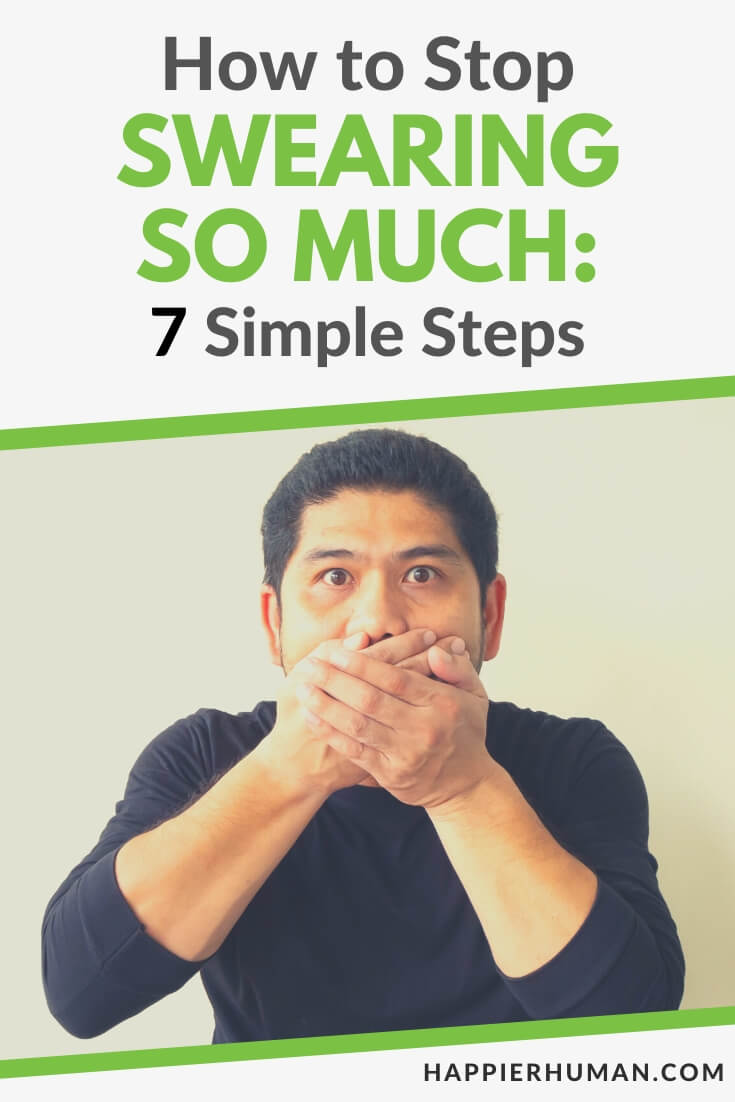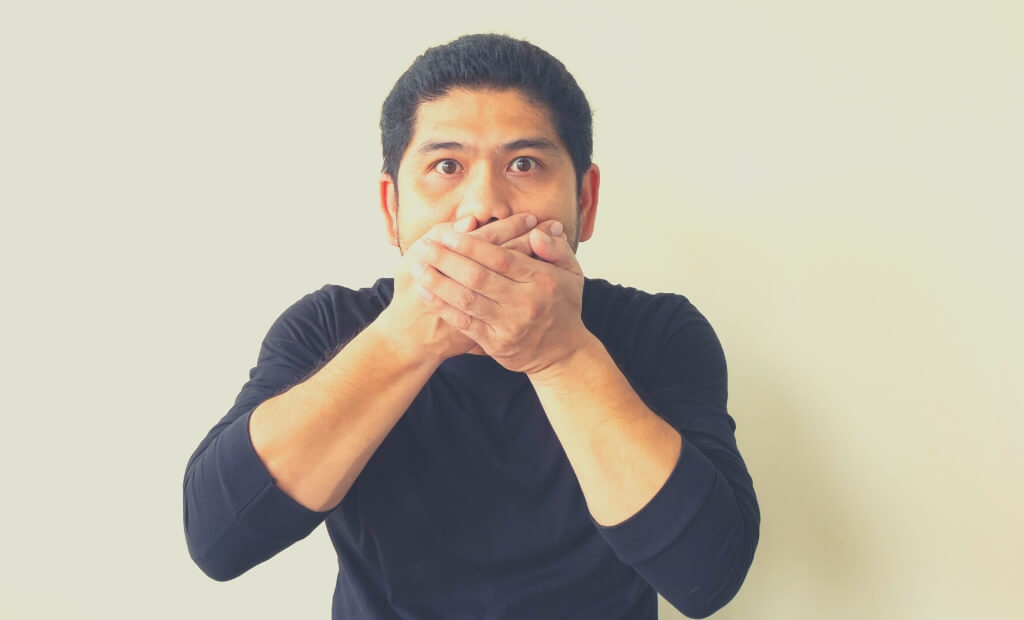Do you have an entirely different set of verbs, nouns, and pronouns that you use when you speak compared to other people? It can involve a specific range of words that have negative meanings, foul explanations, and belittling terms that you use without even thinking. If so, then you swear.
Okay, so unless you’re a monk, you’ve probably got a few choice words that you use to express frustration and pain. We all do—just stub your toe and see what pops out of your mouth.
Most of us know not to use those words in polite company and reserve their use for more relaxed company where that kind of verbal expression is not so out of place. But sometimes, we slip up and use terms that really shouldn’t be part of our vocabulary in public.
These words can land us in hot water at work, in public, and even at home. Swearing isn’t a healthy or wise pastime to engage in. But how do you stop once you’ve made swearing part of your personal language?
We’ve got you covered with our 7 simple steps to stop swearing right here.
What Is Swearing?
Swearing is a word or phrase that is considered impolite or inappropriate. People use these words or phrases since they seem to contain more power and release the moment’s frustration or pain. Hit your thumb with a hammer and you’re not likely to respond with “Oh dearie me, ouch!” If this happens in private, you’d be pretty safe to use any swear word of your choice.
When you swear in public, it comes with ramifications. Some swear words or phrases are derogatory and may even end up landing you in jail. So why do we swear? Surely there are better ways to express your feelings.
We swear because we’ve learned certain words from our family upbringing, friends, colleagues, and other influential figures in our lives. The movies and popular media you consume are also to blame, making swearing more commonplace than before.
Today, we even find family-friendly movies slipping a couple of highly inappropriate words into the dialogue, with little censorship from Hollywood.
What Constitutes Too Much Swearing?
OK, so you swear when you feel frustrated at home, perhaps even at the football team that’s losing on screen or your computer for running a dreaded update when you need to get work done. But what is too much swearing?
Swearing becomes too much when you have no control over it. The words tumble out of your mouth at the slightest provocation, and you don’t seem to care about who hears you anymore.
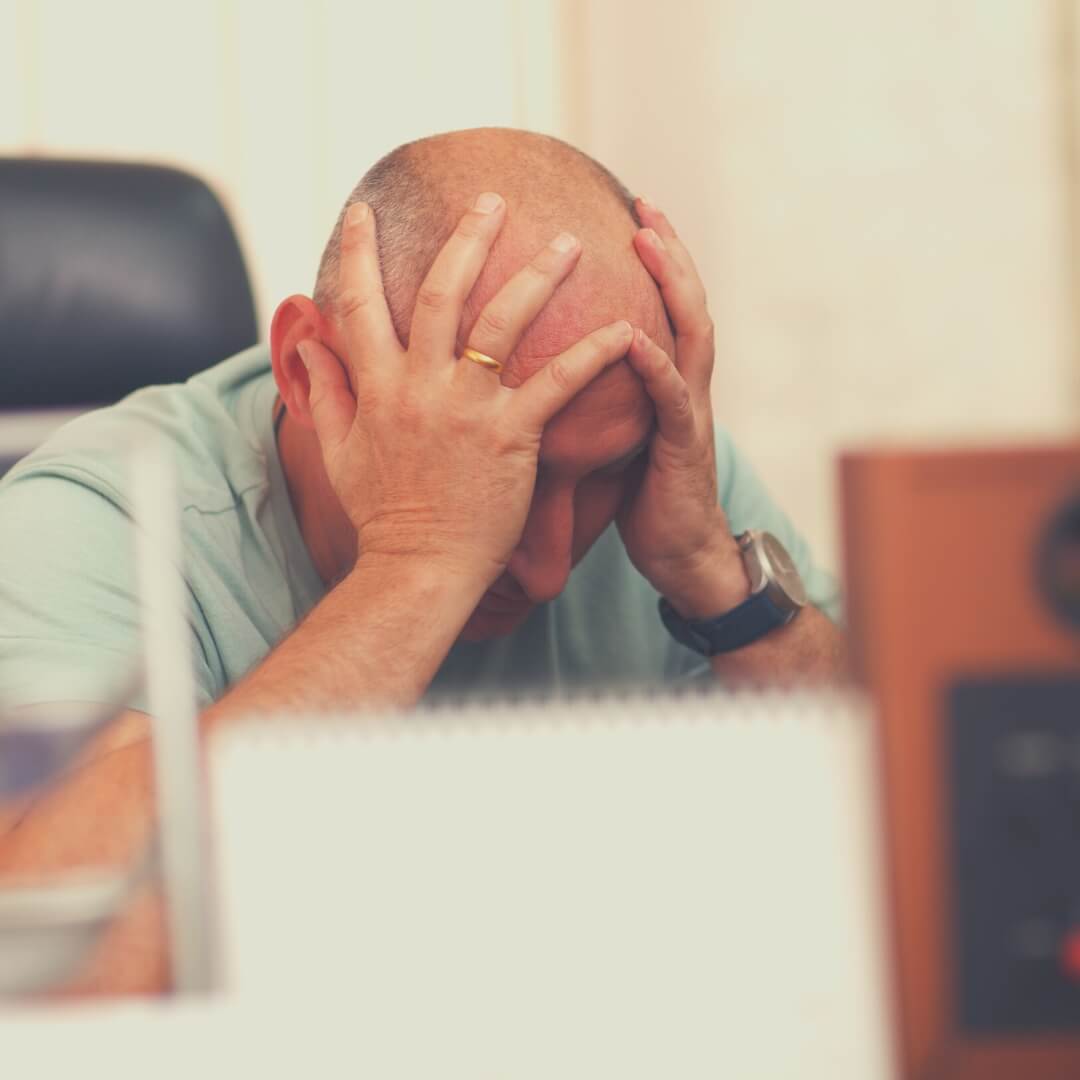
If you use swear words as part of your daily descriptive language and people start commenting on your prolific choice of swear words, you know you are swearing too much.
When it comes to swearing, the safer approach is to use swear words less frequently than you may think is appropriate, or not at all (if possible). Most average people don’t swear frequently, despite what we see on screen.
Reasons Why People Swear
So why do you swear? Here are a couple of situations that may make you swear:
Anger
You swear because someone has made you angry, your car just got a scratch, or your children run through the house, making noise, while you’re in a Zoom meeting. Or you forget to do something and feel angry with yourself, so you swear at yourself.
Frustration
Your boss sets unfair targets at work, or your colleague is particularly slow, making your workday longer. Perhaps your children don’t want to do their homework, or your partner burns dinner (again).
The online banking app is offline when you need to make an emergency payment, or you can’t figure out how to work a new device or alarm system. Frustrating things make you swear.
Disrespect
If someone has really made you angry, you may swear at them, as an expression of disrespect.
Reciprocation
If someone swears at you, chances are that you will swear right back at them. You may also be in the company of people who swear a lot, and you could start swearing to fit in.
A Time and a Place for Swearing
Swearing isn’t appropriate for most polite society’s meetings and exchanges. Swearing at people isn’t acceptable behavior and is considered abusive as well as aggressive. So, where and when can you safely swear?
You can swear more safely when:
The Ugly Side of Swearing
What about the ramifications of swearing? When you swear a lot, there are certain implications that may affect you and those around you. It’s not simply about using harsh words. Swearing carries an implied disrespect to those around you.
Other negative effects of swearing include that swearing is:
Ugly to Hear
Most people don’t like hearing swear words. They don’t like the sound, the disrespect, and the uncontrolled emotions that accompany swear words (whether the words are used in general or directed at them).
A Poor Reflection on You
Swearing is associated with the lower classes in society, which is why the expression is to swear like a sailor. When you often swear, you get a reputation as being uncouth and poorly raised. So, swearing is also a poor reflection on your family.
Bad for Children to Hear
Chances are that if you swear a lot, your family also swears a lot. You have a direct negative impact on your children and any other children who may hear you swear.

Children are sponges, and they may repeat any swear words that you use, even infrequent ones.
Not Going to Make Your Point Any Clearer
Some people use swearing to emphasize their point. By adding in an f-bomb or two, they hope to get their feelings across, when all this does is to make them seem out of control and less credible.
7 Steps to Stop Swearing so Much
When you finally realize that swearing does more harm than good, can negatively affect your reputation, and can actually lead to serious legal implications… it may be time to begin conditioning your mind to stop using swear words as fillers for real communication.
But how do you change from what is a habitual way of speaking to communicating without swear words? Here are a few great steps to help you stop swearing.
Step 1. Notice That You Swear a Lot
To own a problem, you need to first identify it and accept that it’s there. If you deny you drink too much, you will never get over your alcoholism. Likewise, if you don’t begin to realize just how much you swear, you will never be able to change your behavior and stop swearing.
Pro Tip: Keep a swearing diary or journal. In a small notebook, write down each swear word you used in a day, week, month, or longer and how many times you used the word. This requires you to be mindful of the language and swear words you use when speaking to others and yourself. Next to the swear word, write down who you affected with the language you used.
Step 2. Apologize for Your Swearing Behavior
Part of owning up to your swearing habit is to acknowledge that it negatively affects others. Your colleague who gets told to (swear word) every time they bug you is definitely not feeling great about themselves when you swear at them.
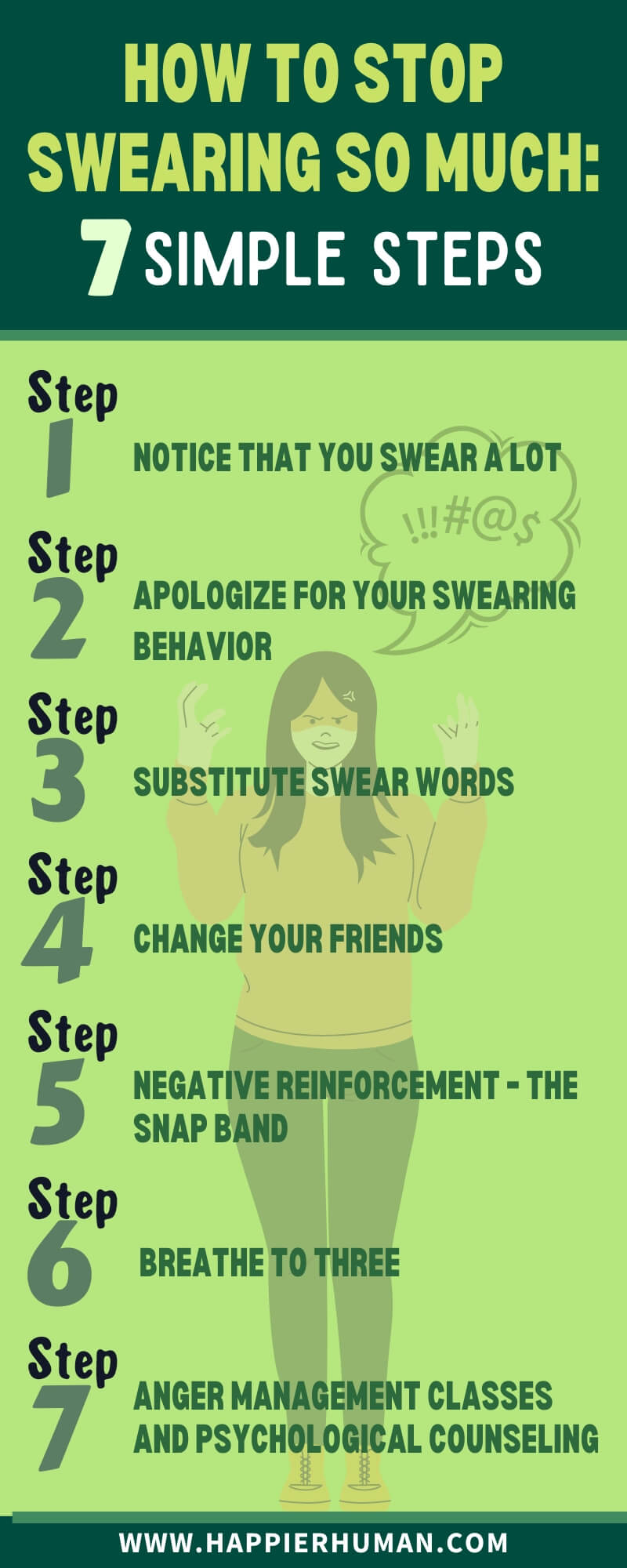
Using the list of names in your swearing diary, go and apologize to each person in turn. Be sincere, sharing with the person you want to change your behavior and acknowledge that your swearing has been unfair and disrespectful to them.
Ask them to remind you if you swear at or near them again as you are struggling with quitting a habitual way of speaking.
Step 3. Substitute Swear Words
If you really struggle with quitting swearing all together, you can start substituting the swear words you use with funny words that will take all of the thrill out of the swearing game.
Instead of dropping an f-bomb, why not rather say something like “oh fudge,” which isn’t as satisfying for conveying the emotion as the swear word, so you may be less likely to use it altogether.
Step 4. Change Your Friends
If you tend to hang out with people who swear a lot, you will also swear a lot. However, if you want to stop swearing, it may mean that you’ll need to make some healthier choices in friends in future.
Like an alcoholic who can’t hang out at the bar with their other alcoholic friends, you have to stop hanging out with the other people in your life who swear equally much.
Step 5. Negative Reinforcement – The Snap Band
When you swear constantly and struggle with identifying when you swear, replace each swear word with a flick from a snap band. The negative association of pain with swearing can help reinforce the concept that swearing is bad.
Step 6. Breathe to Three
Swearing is often anger related, and while you may just want to change the swearing behavior, you may find that your inability to manage anger is really at the heart of the problem. Make it a habit to count to three before you are allowed to say a swear word.
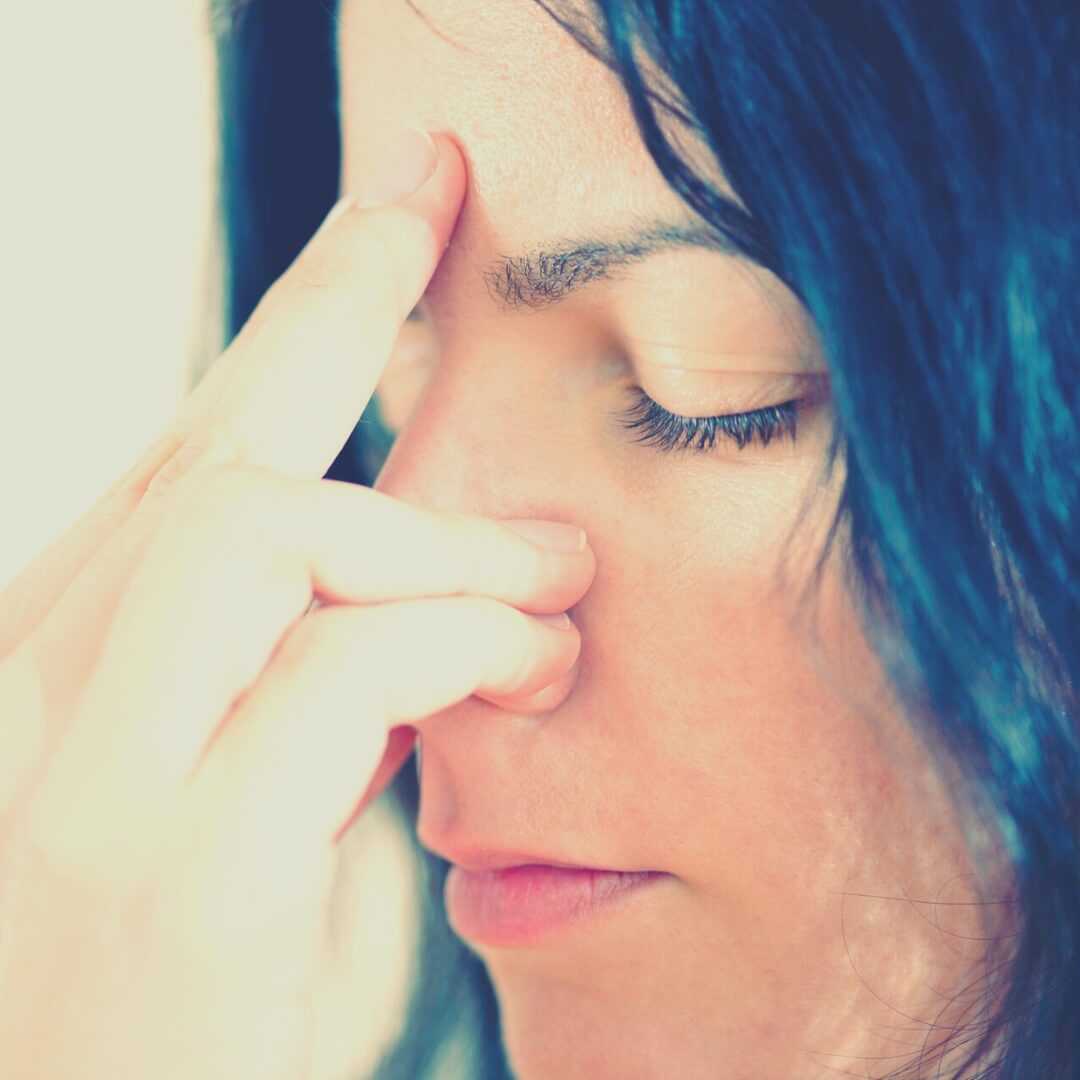
By counting or breathing to three, when you feel the urge to swear diminishes, which makes it more likely that you won’t still swear if you’ve counted to three first.
Step 7. Anger Management Classes and Psychological Counseling
People who swear frequently may need psychological help to manage the thoughts and anger feelings that precede swearing behavior. Chances are that your swearing is about more than just swearing.
Neuro linguistic programming (NLP) can help remove the urge to swear and help reprogram your inner monologue, removing the default “go-to” setting to swear in your brain—like someone who wants to quit smoking, so they begin to associate smoking with ingrown toenails or something else that’s repulsive, reducing their craving to smoke.
Likewise, NLP can help you retrain your brain to reduce the urge to use swear words.
Final Thoughts on How to Stop Swearing
You can stop swearing. It starts with identifying that you are swearing too much and acknowledging the negative effect this has on you and those in your life.
From there, attempt to follow the rest of the steps provided here and make a continuous effort to stop swearing. They really are rather simple, as self-awareness is half the battle.
Still afraid you may stumble off the wagon?
Learning to think before you speak can go a long way in helping you quit swearing. For help with this, make sure to read our article on 13 reasons why you should think before you speak.
You’ve got this!
